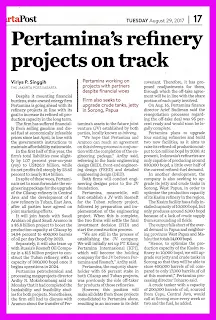Despite it mounting financial burdens, state-owned energy firm Pertamina is going a.head with its refinery projects in line with its goal to increase its refined oil production capacity in the long term.
The firm has suffered financially from selling gasoline and diesel fuel at economically infeasible prices since last April, in line with the governments instructions to maintain affordability nationwide.
In the first half of this year, the firm’s total liabilities rose slightly by 1.07 percent year-on-year (yoy) to US$26.3 billion, while its net profits fell steeply by 23.65 percent to nearly $1.4 billion.
In spite of these woes, Pertamina is set to soon formulate the engineering package for the upgrade of the Cilacap refinery in Central Java and the development of a new refinery in Tuban, East Java, after all parties have agreed on joint marketing efforts.
It will join hands with Saudi Arabian oil giant Saudi Aramco in a $5.8 billion project to boost the production capacity at Cilacap by 14.94 percent to 400,000 barrels of oil per day (bopd) by 2023. Separately it will also team up with Russia’s Rosneft Oil Company in a $15 billion project to construct the Tuban refinery with a capacity of 300,000 bopd once it begins operations in 2024.
Pertamina petrochemical and processing megaprojects director Ardhy N. Mokobombang said on Monday that it had completed the bankability and feasibility studies for both projects. Nonetheless, the firm still had to discuss with Aramco about the transfer of Pertamina’s assets to the future joint venture (JV) established by both parties, locally known as irzbreng.
“We hope that Pertamina and Aramco can reach an agreement on this inbreng process in conjunction with the completion ofthe engineering package,” Ardhy said, referring to the basic engineering design (BED), front-end engineering design (FEED) and detailed engineering design (DED). Both firms will conduct engineering designs prior to the JV foundation.
Pertamina, meanwhile, will first establish a JV with Rosneft for the Tuban refinery project, followed by preparation and implementation of the engineering project. When this is complete, the two firms will settle the final investment decision (FID) and start the construction process.
“We are still in the process of establishing the JV company. We will initially set up PT Kilang Pertamina Internasional [KPl], which will become the holding company for the JV between Pertamina and Rosneft,” Ardhy said.
Pertamina, the majority share holder with 55 percent stake in both Cilacap and Tuban projects, was previously the sole off-taker for products of those refineries. However, this position will make all debts from these projects consolidated to Pertamina alone, resulting in an increase in its debt covenant. Therefore, it has proposed readjustments for them, through which the off-take agreement will be in line with the share portion of each party involved.
On Aug. 16, Pertamina finance director Arief Budiman said the renegotiation processes regarding the off-take deal was 95 percent ready and would soon be legally complete.
Pertamina plans to upgrade four existing refineries and build two new facilities, as it aims to raise its refined oil production output to 2.6 million bopd by 2030. At present, Indonesia’s refineries are only capable of producing around 830,000 bopd, a little over half of the current refined-fuel demand.
In another development, the company is also seeking to upgrade its jetty and crude tanks in Sorong, West Papua, in order to optimize the production capacity of its Kasim refinery in the region. The Kasim facility has a fully installed capacity of 10,000 bopd, but only produces around 6,000 bopd because of a lackof crude supply from surrounding oil fields.
The output falls short ofthe overall demand in Papua and neighboring provinces West Papua and Maluku that totals 24,000 bopd.
“Hence, to optimize the production capacity of the Kasim refinery to 10,000 bopd, we will upgrade our jetty and crude tanks in Sorong so that they will be able to store 400,000 barrels of oil compared to only 17,000 barrels of oil at this moment,” Pertamina processing director Toharso said.
A crude tanker with a capacity of 200,000 barrels of oil, sourced from Cepu, Central Java, would call at Sorong once every week or two and the fuel, he added.
Jakarta Post, Page-17, Tuesday, August 29, 2017


No comments:
Post a Comment